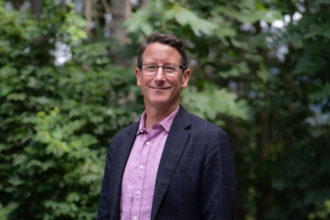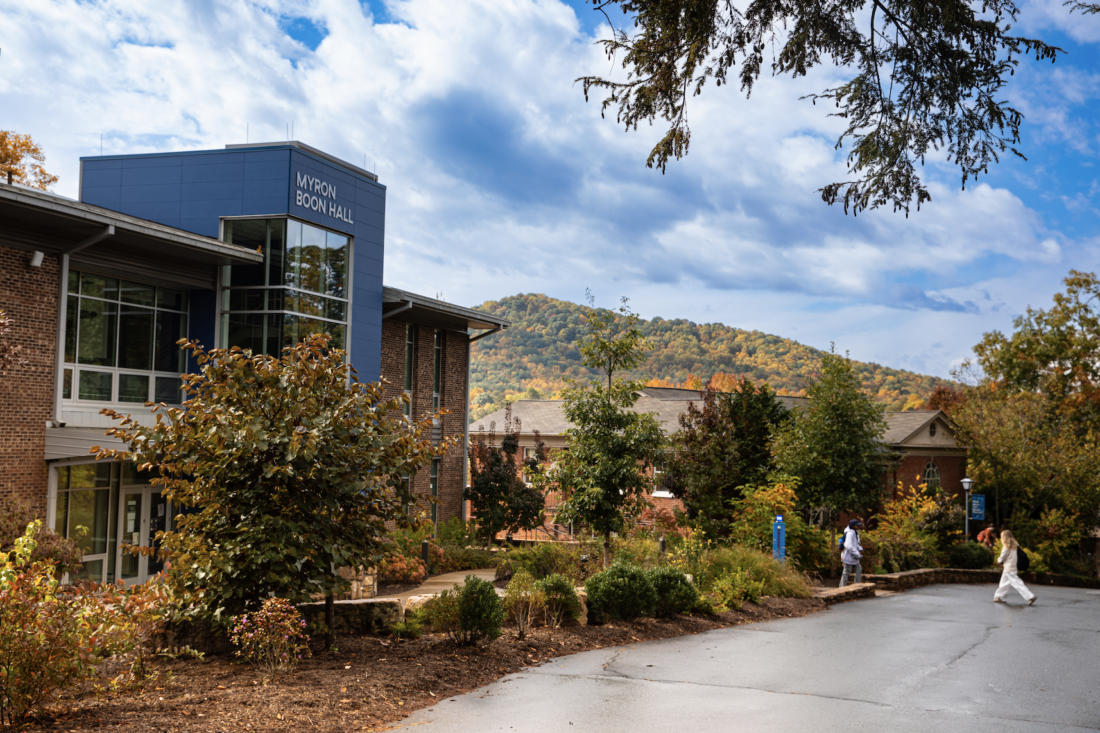Last spring, Warren Wilson College philosophy professor Todd May taught a class on anarchism, followed that fall by a course on ethics. This semester, he’s teaching environmental ethics.
These classes will be some of the last at the Swannanoa liberal arts college to be populated by philosophy majors. Students can still enroll in philosophy classes taught by May and other professors. But philosophy, along with chemistry, math, global studies, and history and political science majors will be unavailable to students who enroll at Warren Wilson beginning in fall 2024.
At the same time, the college is introducing new majors in data science, communications, outdoor business and a combined philosophy and history major, and as well as a new Master of Science program in applied climate science at its graduate school, which is slated to launch in fall 2025.
Warren Wilson Provost Jay Roberts calls the college’s substantial shuffle of academic offerings, announced in October, a “rebalancing.” Alongside layoffs, frozen positions and increased fundraising, he says, the changes will address financial woes wrought by flattening tuition revenue and increased expenses. The school is facing a $5.5 million budget deficit, according to Mary Bates, director of communications.
A committee composed of faculty members from each of the college’s divisions conducted a review for all enrolled majors, which led to the changes, Roberts says. Criteria included class enrollment and total number of declared majors over three- to five-year increments, admissions data and what Roberts called “market demand,” meaning whether prospective students showed interest in the programs.
The remaining criteria were the college’s mission and vision alignment under its new president, Damián Fernández, who joined the college in June. Taken altogether, “the data was fairly clear” on which majors to change, Roberts says.
Employment prospects
Andy Paul, an adjunct humanities professor at A-B Tech who has previously taught at UNC Asheville, says institutions where he has taught have kept faculty informed about enrollment in their departments, and there is a “constant conversation” about raising those numbers. It’s a reminder that ultimately colleges — whether public like A-B Tech and UNCA or private like Warren Wilson College — are enterprises that need to supply a demand.

One of the many factors that can influence enrollment is the belief that a main goal of higher education should be to foster higher incomes for graduates. That is especially influential in students’ choices of a major during times of economic hardship, Paul explains, citing research that students increasingly major in engineering and business as unemployment rises.
“People say when the economy is bad, that’s when you see students trying to be shrewd and saying, ‘Hey, I need money — I’m going to do computer science or engineering,’” he says. But he also notes that students don’t necessarily enter careers, or remain in careers, tied to their majors. (The U.S. Bureau of Labor Statistics provides in-depth information about occupations in degree fields at avl.mx/d6l.)
May, the philosophy professor, points out that students nationwide are taking on more debt than they did in the past. According to a recent report from the College Board, 51% of bachelor’s degree recipients from four-year institutions in 2021-22 had debt, and the average debt among borrowers was $29,400. May thinks the pressure of paying off student loan debt “reinforces the idea of college simply as job training.”
Still, he is realistic about labor prospects in his chosen field. “Getting a Ph.D. in philosophy, the unemployment rate is like 50% or higher,” May says. “So, I tell people that an undergraduate degree in philosophy is one of the best degrees you can get. But don’t go to grad school [for philosophy] unless you can’t see yourself doing anything else. Because the job market is so bad.”
What’s the point of college?
Professors who spoke with Xpress say discussions about the value of higher education, and the particular scrutiny that falls on the humanities, can take worrisome directions. “Increasingly, there’s this understanding that college is no longer about finding yourself — it’s no longer about civic education, how to become a good citizen,” says Paul. “It’s really sad to see that become diminished.”
Humanities and social sciences — which include sociology, anthropology, gender and sexuality studies, cultural studies, religious studies and art history — can be framed as too political. “Oftentimes, the subtext to the attack on philosophy is that it engages in critical reflection,” May explains. “So, people who are doing the funding — generally state governments — are not always keen on critical reflection.”
Warren Wilson will still teach classes in all the subjects affected by the changes, Roberts emphasizes, but he says it’s not economically viable for the college to offer them as majors. Majors require upper-level courses to support that track. The majors affected by the revamp are “from a financial point of view, underenrolled,” Roberts explains. “They may only have six students or eight students in the class at an upper level, when for us to maintain financial efficiency, they should be enrolled at 10 or 12 or 16.”
The logic of focusing on the most populous majors makes sense to Paul. Colleges are “making money off of their general education courses,” he notes. “They’re not making money off of their majors.”

Paul says he recognizes that academic reshuffling like the one happening at Warren Wilson isn’t due to “some malicious board or some malicious president. … It’s just where we’re at and where we’ve gone in the last few decades.” He points to West Virginia University, which recently eliminated 32 undergraduate and graduate programs, including all its foreign language programs, according to The New Republic. The university is anticipating a $45 million budget shortfall.
Roberts notes that the college tracks academic interests from prospective students and continues to follow their “funnel” through to acceptance, enrollment and graduation. “It’s one proxy for giving a sense of value,” he explains. But he admits, “It’s never a perfect science, by any stretch.”
Warren Wilson’s “areas of strength” are environmental science, psychology, art, business, creative writing and biology, Roberts says. High school students who consider applying to the college think highly of those programs, and enrollment reflects that. Yet there is a chicken-and-egg conundrum here as well, he says. “It’s become a bit of a self-fulfilling prophecy in terms of students wanting to attend because they know that we have a strong art program, or we have a strong creative writing program [and therefore they apply].”
Nevertheless, the academic rebalancing is “trying to be strategic about how we invest and where we invest, to either shore up areas of strength or to give us an opportunity to grow in new areas,” Roberts adds. Citing the new communications major, he noted one faculty member who is “an accomplished podcaster” and the recent hire of media studies scholar Beck Banks as assistant professor.
Fundraising
Stepping up fundraising efforts is one strategy Warren Wilson is pursuing to address its budget deficit. Here, it faces some unique challenges. Warren Wilson became a four-year college in 1966 — a comparatively “young” school, the provost explains. Its eldest graduates are reaching their 80s only now, and therefore the college has yet to benefit from generations of large donations from alumni bequests. What’s more, the college’s enrollment is under 1,000 students per year, so it doesn’t have a huge alumni base to begin with. Roberts calls the college’s endowment “modest — $55 million.”
Therefore, Warren Wilson is also looking for support from other “friends” of the college, Roberts says. And he notes that those friends can come from unlikely places. The band Pearl Jam, for example, financed agrovoltaics research at Warren Wilson — solar power installation alongside agriculture — in 2022 as part of a campaign to offset carbon emissions generated by their touring.
Roberts says that, nationwide, higher education revenue has been flat regarding tuition, so schools are increasingly pursuing nontuition revenue. Warren Wilson has now joined that wave.
For example, the college is considering more summer programs, which could include summer camps and adult education classes, that would utilize the dorms and classroom spaces. Amid the shifting academic landscape and difficult, if arguably necessary, choices, Warren Wilson is still sketching out such initiatives. The process will be propelled, Roberts notes, by the college’s recent hiring of ’00 alum Amy Frey Ager, the entrepreneur behind Hickory Nut Gap Farm in Fairview, as executive director of strategic ventures, partnerships and programs. She will “think creatively about new business ventures for the college,” he says.
“Her job is to build out more partnerships for Warren Wilson in the regional community — this nontuition revenue — and opportunities for Warren Wilson to partner with other organizations where we can be mutually beneficial,” Roberts explains. “How do you think creatively about new business ventures for the college?”




I don’t know the curriculum at Warren Wilson but it seems the student body is ripe for learning both the physical nature and the business aspects of farming, CSA management, agricultural entrepreneurship, etc. Students obviously like the service/work/academic profile at WWC so just teach them to succeed on that path when they graduate. Bring in leaders from the region to speak about how they struggled and overcame challenges to build a successful business. Actually that could be true for the arts, black smithing, anything skills based that students are hands on with. Its tough as a professor to cover all the material AND teach students the nuts and bolts of succeeding in turning a passion into a sustainable income but thats exactly what graduates need. We are rooting for you to succeed Warren Wilson College! -Mason
yes, hoping for only the best for Warren Wilson and the rest of the many smaller fine liberal arts colleges here in the US that are facing serious financial viability challenges ….all while the billionaire class is “generously” giving many millions to Harvard, Stanford et al in hopes of having a building named after them. sigh.